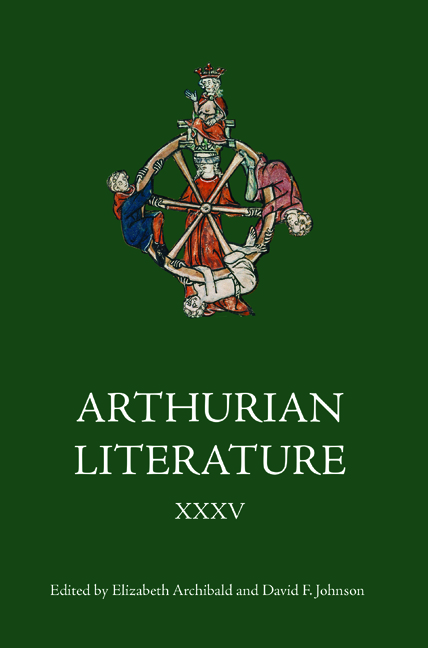Book contents
- Frontmatter
- Contents
- List of Illustrations
- General Editors’ Foreword
- List of Contributors
- I Arthurian Swords I: Gawain’s Sword and the Legend of Weland the Smith
- II Rex rebellis et vir pacificus: Civil War and Ecclesiastical Peacekeeping in the Vita Gildae of Caradog of Llancarfan
- III Once and Future History: Textual Borrowing in an Account of the First War of Scottish Independence
- IV ‘Me rewes sore’: Women’s Friendship, Affect and Loyalty in Ywain and Gawain
- V The Sacred and the Secular: Alchemical Transformation in The Turke and Sir Gawain
- VI ‘The native place of that great Arthur’: Foreignness and Nativity in Sixteenth-Century Defences of Arthur
- VII John Steinbeck’s ‘Wonder-Words’
- VIII The Once and Future King of Atlantis: The Arthurian Figure in Geoff Johns’s Aquaman: Death of a King
- IX Arthur and/or the Grail
- Miscellaneous Endmatter
VII - John Steinbeck’s ‘Wonder-Words’
Published online by Cambridge University Press: 11 September 2020
- Frontmatter
- Contents
- List of Illustrations
- General Editors’ Foreword
- List of Contributors
- I Arthurian Swords I: Gawain’s Sword and the Legend of Weland the Smith
- II Rex rebellis et vir pacificus: Civil War and Ecclesiastical Peacekeeping in the Vita Gildae of Caradog of Llancarfan
- III Once and Future History: Textual Borrowing in an Account of the First War of Scottish Independence
- IV ‘Me rewes sore’: Women’s Friendship, Affect and Loyalty in Ywain and Gawain
- V The Sacred and the Secular: Alchemical Transformation in The Turke and Sir Gawain
- VI ‘The native place of that great Arthur’: Foreignness and Nativity in Sixteenth-Century Defences of Arthur
- VII John Steinbeck’s ‘Wonder-Words’
- VIII The Once and Future King of Atlantis: The Arthurian Figure in Geoff Johns’s Aquaman: Death of a King
- IX Arthur and/or the Grail
- Miscellaneous Endmatter
Summary
This essay seeks to open up an area of study upon which few Arthurians seem to focus: John Steinbeck's debt to, and appreciation of, the medieval. As his corpus of novels attests, he was an author who was familiar with Malory's Morte Darthur. Quite how significant this earlier literary culture was to him has yet to be thoroughly revealed from his thousands of letters, his memoir and his extant manuscript materials. This study will examine one item of evidence from Stanford University Library's Special Collections, which has an extensive Steinbeck collection. The Wells Fargo Steinbeck Collection includes a large deposit of letters, books and photographs that formerly belonged to Steinbeck's sister, Esther Steinbeck Rodgers. Among this rich set of materials is John Steinbeck's own edition of the three-volume The Works of Sir Thomas Malory, edited by Eugène Vinaver in 1947 (Figures 7.1 and 7.2). Stanford only has volumes 1 and 2, and it is rumoured that Vinaver may have given these particular volumes to Steinbeck himself when the two authors met in the years just preceding Steinbeck's stay in England in 1959. In that year, Steinbeck spent a six-month period with his wife, Elaine, at Discove Cottage in Bruton, Somerset, England, so that he could begin creating his modern adaptation of Malory's Le Morte Darthur. It seems he began that task by paying careful attention to Vinaver's edition of Malory.
Within Stanford's edition of Malory, numerous pages contain Steinbeck's own annotations to the Middle English, as he worked on the very early stages of his Arthurian project to transliterate and understand the nuances of Malory's text. This short essay offers a preliminary discussion of some of these annotations to indicate their potential for illuminating the value Steinbeck placed on reading medieval literature in its original form in the mode of a critical glossator, and his overarching desire to make that literature more widely available to modern American readers. It will highlight Steinbeck's glossing and editorial practice to illustrate some of the key features of this work, such as modernization and syntactic reduction. The discussion will thus provide a brief overview of Steinbeck's methods to show how he adapted Malory in his posthumously published, and incomplete, adaptation, The Acts of King Arthur and His Noble Knights.
- Type
- Chapter
- Information
- Arthurian Literature XXXV , pp. 173 - 191Publisher: Boydell & BrewerPrint publication year: 2019

